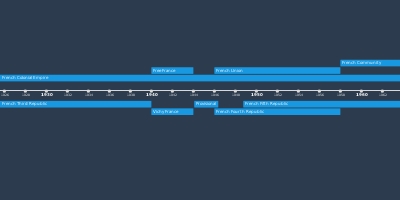Charles de Gaulle (1 jun 1958 año – 8 ene 1959 año)
Descripción:
The Fourth Republic was wracked by political instability, failures in Indochina, and inability to resolve the Algerian question.On 13 May 1958, the Pied-Noir settlers seized the government buildings in Algiers, attacking what they saw as French government weakness in the face of demands among the FLN demand for Algerian independence. A "Committee of Civil and Army Public Security" was created under the presidency of General Jacques Massu, a Gaullist sympathiser. General Raoul Salan, Commander-in-Chief in Algeria, announced on radio that he was assuming provisional power, and appealed for confidence in himself.
At a 19 May press conference, de Gaulle asserted that he was at the disposal of the country. As a journalist expressed the concerns of some who feared that he would violate civil liberties, de Gaulle retorted: "Have I ever done that? On the contrary, I have re-established them when they had disappeared. Who honestly believes that, at age 67, I would start a career as a dictator?" A constitutionalist by conviction, he maintained that he would accept power only from the lawfully constituted authorities. De Gaulle did not wish to repeat the difficulty the Free French movement experienced in establishing legitimacy as the rightful government. He told an aide that the rebel generals "will not find de Gaulle in their baggage".
The crisis deepened as French paratroops from Algeria seized Corsica and a landing near Paris was discussed (Operation Resurrection).
Political leaders on many sides agreed to support the General's return to power, except François Mitterrand, Pierre Mendès France, Alain Savary, the Communist Party, and certain other leftists.
On 29 May the French President, René Coty, told parliament that the nation was on the brink of civil war, so he was
"turning towards the most illustrious of Frenchmen, towards the man who, in the darkest years of our history, was our chief for the reconquest of freedom and who refused dictatorship in order to re-establish the Republic. I ask General de Gaulle to confer with the head of state and to examine with him what, in the framework of Republican legality, is necessary for the immediate formation of a government of national safety and what can be done, in a fairly short time, for a deep reform of our institutions."
De Gaulle accepted Coty's proposal under the precondition that a new constitution would be introduced creating a powerful presidency in which a sole executive, the first of which was to be himself, ruled for seven-year periods. Another condition was that he be granted extraordinary powers for a period of six months.
De Gaulle remained intent on replacing the weak constitution of the Fourth Republic. He is sometimes described as the author of the new constitution, as he commissioned it and was responsible for its overall framework. The actual drafter of the text was Michel Debré who wrote up de Gaulle's political ideas and guided the text through the enactment process. On 1 June 1958, de Gaulle became Prime Minister and was given emergency powers for six months by the National Assembly, fulfilling his desire for parliamentary legitimacy.
De Gaulle's cabinet received strong support from right-wing parties, split support from left of center parties, and strong opposition from the Communist Party. In the vote on 1 June 1958, 329 votes were cast in favor and 224 against, out of 593 deputies. On 28 September 1958, a referendum took place and 82.6 percent of those who voted supported the new constitution and the creation of the Fifth Republic. The colonies (Algeria was officially a part of France, not a colony) were given the choice between immediate independence and the new constitution. All African colonies voted for the new constitution and the replacement of the French Union by the French Community, except Guinea, which became the first French African colony to gain independence and immediately lost all French assistance.
Añadido al timeline:
fecha:
1 jun 1958 año
8 ene 1959 año
~ 7 months
